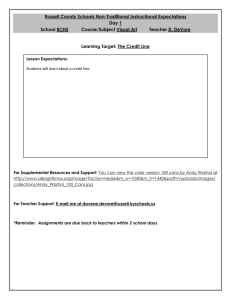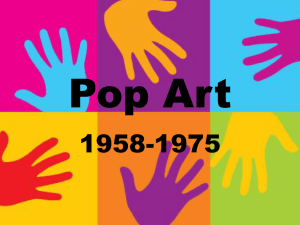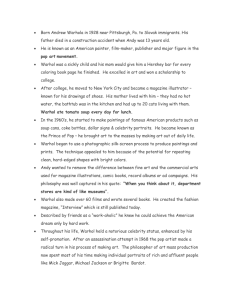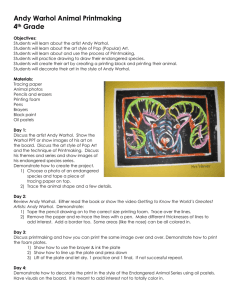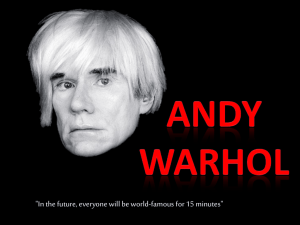Becoming a great artist is about more than making great art. “An
advertisement
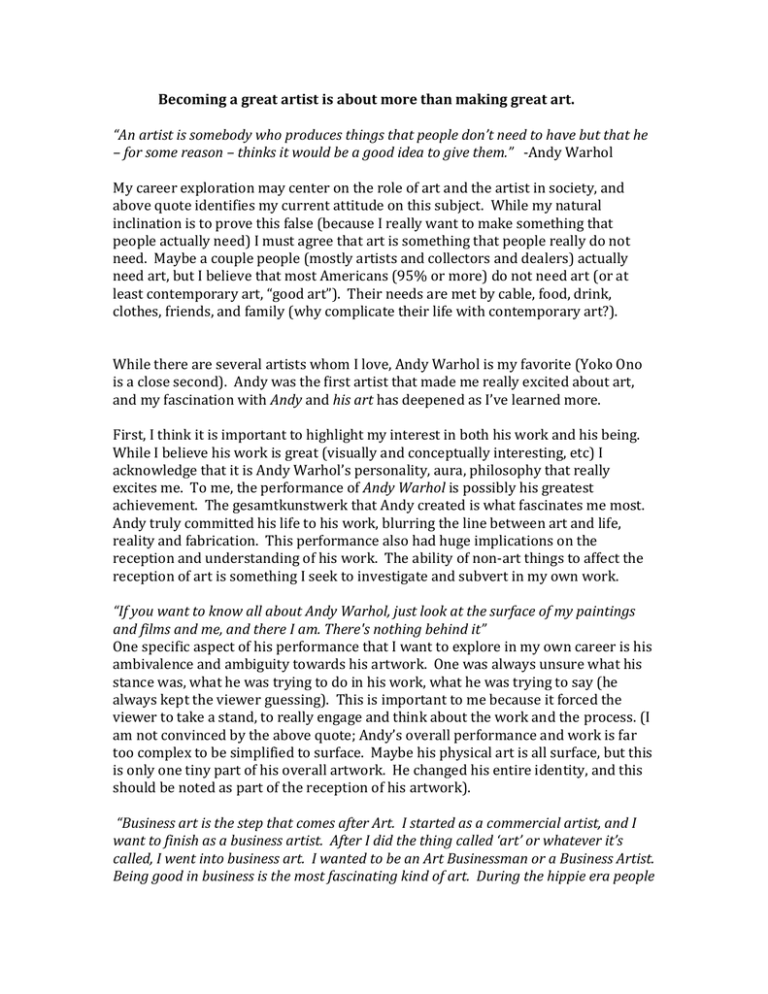
Becoming a great artist is about more than making great art. “An artist is somebody who produces things that people don’t need to have but that he – for some reason – thinks it would be a good idea to give them.” -Andy Warhol My career exploration may center on the role of art and the artist in society, and above quote identifies my current attitude on this subject. While my natural inclination is to prove this false (because I really want to make something that people actually need) I must agree that art is something that people really do not need. Maybe a couple people (mostly artists and collectors and dealers) actually need art, but I believe that most Americans (95% or more) do not need art (or at least contemporary art, “good art”). Their needs are met by cable, food, drink, clothes, friends, and family (why complicate their life with contemporary art?). While there are several artists whom I love, Andy Warhol is my favorite (Yoko Ono is a close second). Andy was the first artist that made me really excited about art, and my fascination with Andy and his art has deepened as I’ve learned more. First, I think it is important to highlight my interest in both his work and his being. While I believe his work is great (visually and conceptually interesting, etc) I acknowledge that it is Andy Warhol’s personality, aura, philosophy that really excites me. To me, the performance of Andy Warhol is possibly his greatest achievement. The gesamtkunstwerk that Andy created is what fascinates me most. Andy truly committed his life to his work, blurring the line between art and life, reality and fabrication. This performance also had huge implications on the reception and understanding of his work. The ability of non-art things to affect the reception of art is something I seek to investigate and subvert in my own work. “If you want to know all about Andy Warhol, just look at the surface of my paintings and films and me, and there I am. There's nothing behind it” One specific aspect of his performance that I want to explore in my own career is his ambivalence and ambiguity towards his artwork. One was always unsure what his stance was, what he was trying to do in his work, what he was trying to say (he always kept the viewer guessing). This is important to me because it forced the viewer to take a stand, to really engage and think about the work and the process. (I am not convinced by the above quote; Andy’s overall performance and work is far too complex to be simplified to surface. Maybe his physical art is all surface, but this is only one tiny part of his overall artwork. He changed his entire identity, and this should be noted as part of the reception of his artwork). “Business art is the step that comes after Art. I started as a commercial artist, and I want to finish as a business artist. After I did the thing called ‘art’ or whatever it’s called, I went into business art. I wanted to be an Art Businessman or a Business Artist. Being good in business is the most fascinating kind of art. During the hippie era people put down the idea of business – they’d say, ‘Money is bad,’ and ‘Working is bad,’ but making money is art and working is art and good business is the best art.” Warhol exposed and embraced art’s status as a commodity. In my own art career, one of the most interesting things to explore and think about is art’s place in society, particularly in a capitalist society. In my exploration, art’s status as a commodity can go neither unchallenged nor embraced. I’ve been playing with the idea of making art explicitly for collectors and making art explicitly for people (2 different lines, like a fashion designer), and trying to identify the differences in form, content, and value. I believe Jeff Koons and Damien Hirst have built on Warhol keen market understanding, but I believe I can offer something that the three of them haven’t (I haven’t found it yet, but I believe it will come). One possibility is an exploration between business, specifically entrepreneurship, and art. While I used to be completely uninterested in business and money, I have since explored and questioned this value system (this may or may not be related to my dad being an entrepreneur, and that he loves music and wants to sell his business as soon as possible so he can retire and make music and art for the rest of his life). I see many connections between entrepreneurship and art, and wonder if I can blur the line between the two in my career by starting a real business, providing a thing or service that people actually need (or create/stimulate the need and capitalize on it). “…I'd asked around 10 or 15 people for suggestions. Finally one lady friend asked the right question, 'Well, what do you love most?' That's how I started painting money.” Another thing I have incorporated into my artistic process is asking common people for suggestions or feedback. This relates back to my desire to make art for common people. To do this successfully, I need to understand them better (their tastes, their values, etc). “This talk of bluejeans was making me very jealous. Of Levi and Strauss. I wish I could invent something like bluejeans. Something to be remembered for. Something Mass.” I believe Warhol was very aware of his place in history, in art history, and I think he used this awareness very intelligently. While I think many artists are keen on living forever in their work, I think Warhol was the absolute master of this. Like many other aspiring artist, I too would like to make a significant contribution to the art world or the world at large before I die. Admittedly, I am interested in reading about the career trajectory of people like Warhol and Hirst; I believe there is much to be learned. For example, Warhol began doing comic strip appropriation paintings early in his “art” career, but disbanded it because Lichtenstein already made a name doing it, and was doing it well. Warhol let Lichtenstein be the comic strip guy, wanting to be known for something important of his own. This brings up another aspect of Warhol’s career that I think is a valuable tool for my career: branding. I think branding does many other important things for one’s career and the reception of his/her artwork. I would like to have a brand someday, if only to subvert it, manipulate it, or destroy it. Other favorites worth mentioning… -Yoko Ono -Hans Haake -Marcel Duchamp -Damien Hirst -Bruce Nauman -Jake and Dinos Chapman -Felix Gonzalez Torres -John Cage -Richard Prince -Maurizio Cattelan -Dan Flavin -Merce Cunningham -Robert Rauschenberg - Jean-Michel Basquiat -Joseph Kosuth - George Maciunas -Kara Walker -Dread Scott
